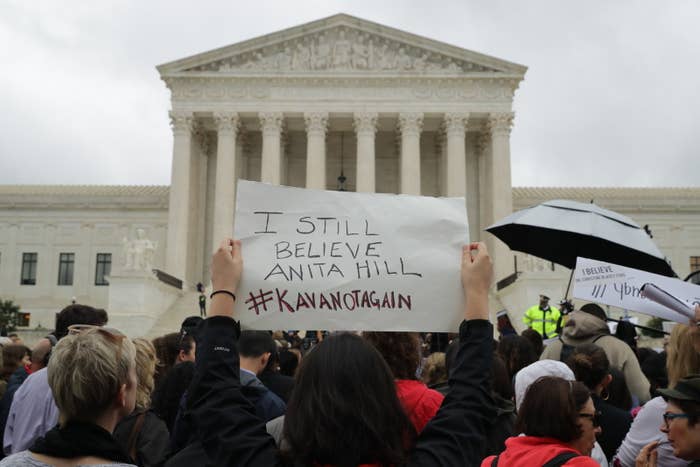
I don’t know Brett Kavanaugh personally, but all my friends who know him say he is a good man and he conducts himself honorably. I don’t know Professor Christine Blasey Ford, but from the people who do know her, I can infer that she is also a good woman who conducts herself honorably. Kavanaugh could have done what Ford has accused him of back when he was 17 and gone on to be a remarkable student, father, husband, and judge; those two behaviors are not mutually exclusive. So the question is, who is telling the truth regarding what happened on that day more than three decades ago?
I believe her.
I was a victim of sexual abuse. I was 5 years old. I may not remember what color dress I was wearing or how long my hair was, but the times, the locations, and most importantly how I felt are ineradicable. They live forever in my mind.
It took 18 years before I shared those awful memories for the first time. It was to the man I was about to marry. It took another four years before I told my mother. I did not even mention it to the FBI when they interviewed me as part of an extensive background check I underwent to become the treasurer of the United States in 2001.
It wasn’t until I was 49 years old, in 2007, that I went public with that horrific episode of my life. I wrote about it in my biography, meaning finally, after more than four decades, all my family and friends — along with the rest of the world — found out about it.
Today I often give keynote speeches, and sometimes I talk about those awful experiences; each time is both excruciatingly painful and ugly. In every single conference where I have shared these memories, invariably at least one woman approaches me afterward and says, “It happened to me too.” Often they tell me that they have never shared this with anyone else. Some of these women are in their seventies and my heart shatters. I see their anguish, I cry with them, and I just wish I could take their pain away. But I know all too well that those emotions will be with them, as they are with me, for the rest of their lives.
Professor Ford has absolutely no reason to make something like this up. This is not fun, and it’s not a pathway to a better life — just the opposite. This is so very hurtful. She has lived with those atrocious feelings all these years, and the trauma even affected her marriage. Why would she put herself on this torturous path unless what she says happened is true?
But in a world where politics has infected every inch of our daily lives, it is not surprising that the polarization in our country would extend to something as straightforward as this. Those who support Judge Kavanaugh’s nomination to the Supreme Court have insulted Ford, attacked her integrity, questioned her motives, and threatened her and her family. Others have promoted ridiculous conspiracy theories or attempted to prove that Ford’s memories are wrong. Even as Kavanaugh has categorically denied Ford’s claims, some of his supporters have chosen instead to say that even if they are true — that is, even if he is lying — they are the kind of youthful indiscretions that shouldn’t matter when considering a Supreme Court nominee.
If all goes to plan, Ford will testify before the Senate Judiciary Committee later this week, as will Kavanaugh; Democrats and Republicans alike will be given the chance to ask important questions of each of them.
Republicans, and especially male senators on the Judiciary Committee, should be extremely careful about how they treat Ford during the hearings and the days that follow. They should remember voters’ anger about the dismissive and disrespectful treatment of Anita Hill, and know that their behavior could have dire consequences at the polls come the midterm elections on Nov. 6.
I strongly caution anyone who has not been a victim of sexual abuse, molestation, or harassment: Do not judge her. Just be grateful you have never been in her shoes.
Rosario Marin served as treasurer of the United States from 2001 to 2003. She is the author of Leading Between Two Worlds.
